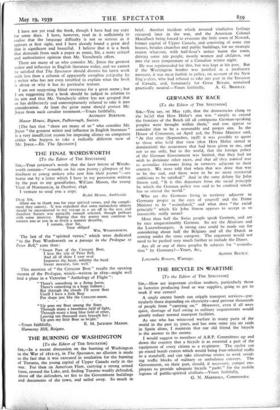THE BURNING OF WASHINGTON
[To the Editor of THE SPECTATOR]
Sit,—In a recent discussion on the burning of Washington in the War of 1812-15, in The Spectator, no allusion is Made to the fact that it was executed in retaliation for the burning of Toronto, the. young capital of Upper Canada early, in the war. For then an American Fleet, carrying a strong armed force, crossed the Lake, and, finding Toronto wealdy defended, drove off the defenders, set fire to the Government buildings and documents of the town, and sailed away. So much in
brief. Another incident which aroused vindictive feelings occurred later in the war, and the American Colonel Maculloch being forced to evacuate the little town of Newark, former capital of Upper Canada, and consisting of some 200 houses, besides churches and public buildings, for no strategic reason whatever, with half-hour's notice burnt the town, driving some 5oo people, mostly women and children, out into the zero temperature of a Canadian winter night.
He was reprimanded for this, but was kept at his post. But if the Washington bonfire was justified as a retaliatory measure, it was most foolish in policy, on account of the New Enea-Iders, who had refused to take any part in the Invasion of Canada, and, fortunately for Great Britain, remained practically neutral.—Yours faithfully, A. G. BRADLEY.


















































 Previous page
Previous page